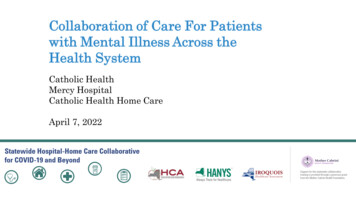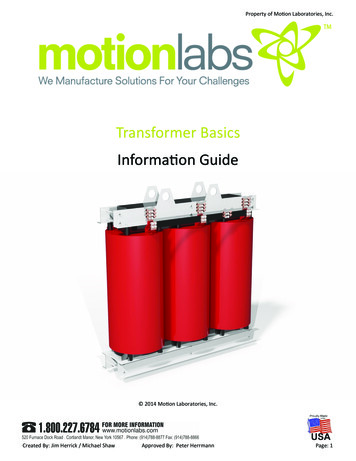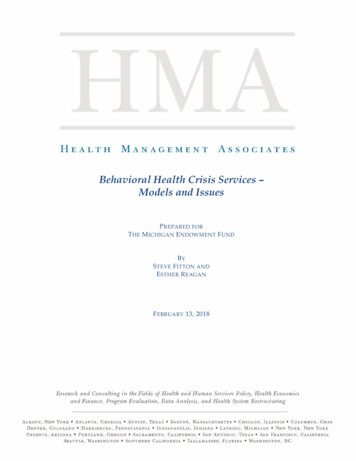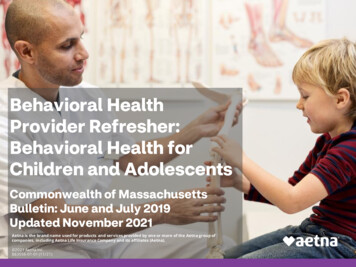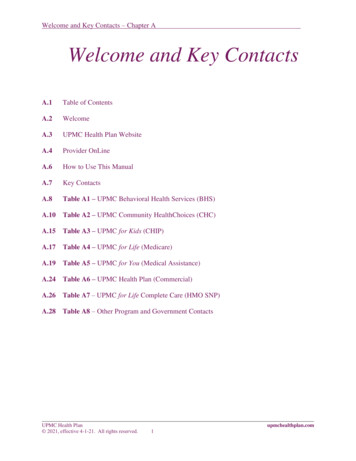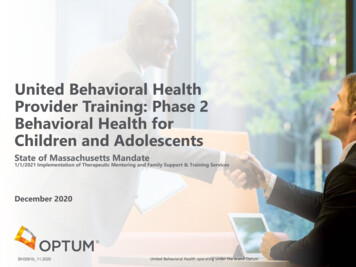
Transcription
United Behavioral HealthProvider Training: Phase 2Behavioral Health forChildren and AdolescentsState of Massachusetts Mandate1/1/2021 Implementation of Therapeutic Mentoring and Family Support & Training ServicesDecember 2020BH3091b 11.2020United Behavioral Health operating under the brand Optum
BHCA Phase 2 Provider Training TopicsBehavioral Health for Children and Adolescents1Medical Necessity Criteria: Therapeutic Mentoring(TM) and Family Support & Training (FS&T)2Credentialing and Certification for TM and FS&TServices3456Billing for TM and FS&T ServicesSupervisory Protocol for BHCA Services (Including TM andFS&T)BHCA Phase 1 Service Refresher: Including ModifiedIntensive Care Coordination (ICC) ProcessQ&A2
Medical Necessity Criteria:Therapeutic Mentoring and Family Support & Training
Therapeutic Mentoring (TM)Medical Necessity CriteriaTherapeutic Mentoring ServicesAdmission Criteria Therapeutic Mentoring. Medically necessary servicesprovided to a child designed to support age-appropriatesocial functioning or to ameliorate deficits in the child’sage-appropriate social functioning resulting from a DSMdiagnosis; provided, however, that such services mayinclude supporting, coaching and training the child inage-appropriate behaviors, interpersonal communication,problem solving, conflict resolution and relatingappropriately to other children and adolescents and toadults. A comprehensive behavioral health assessment indicates that themember’s clinical condition warrants this service in order to supportage-appropriate social functioning or ameliorate deficits in themember’s age-appropriate social functioning. Such services are provided, when indicated, where thechild resides, including in the child’s home, a foster home,a therapeutic foster home, or another community setting. Therapeutic mentoring is a skill building servicesupporting specific elements one or more goals on theyouth’s behavioral health treatment plan developed bythe primary treating clinician. It may also be delivered inthe community, to allow the youth to practice desiredskills in appropriate settings. The member requires education, support, coaching, and guidanceimage-appropriate behaviors, interpersonal communication,problem-solving and conflict resolution, and relating appropriatelyto others to address daily living, social, and communication needsand to support the member in a home, foster home, or communitysetting, OR the member may be at risk for out-of-home placementas a result of the member’s mental health condition OR requiressupport in transitioning back to the home, foster home, orcommunity from a congregate care setting. Outpatient services alone are not sufficient to meet the member’sneeds for coaching, support, and education. Required consent is obtained The member is currently engaged in outpatient services, In-HomeTherapy, Family Stabilization Team, or ICC and the provider or ICCCPT determine that Therapeutic Mentoring Services can facilitatethe attainment of a goal or objective identified in the treatmentplan or ICP that pertains to the development of communicationskills, social skills and peer relationships. Services provided by therapeutic mentors are within the scope oftheir training and certification.BH3091b 11.2020Confidential property of Optum. Do not distribute or reproduce without express permission from Optum.4
Therapeutic Mentoring (TM)Medical Necessity CriteriaContinuing Stay CriteriaDischarge Criteria The member’s clinical condition continues to warrantTherapeutic Mentoring Services in order to continueprogress toward treatment plan goals. The member no longer meets admission criteria for this levelof care or meets criteria for a less or more intensive level ofcare. The member’s treatment does not require a moreintensive level of care. The treatment plan/ICP goals and objectives have beensubstantially met, and continued services are not necessaryto prevent worsening of the member’s behavioral healthcondition. No less-intensive level of care would be appropriate. Care is rendered in a clinically appropriate manner andfocused on the member’s behavioral and functionaloutcomes as described in the treatment plan/ICP. Progress in relation to specific behavior, symptoms, orimpairments is evident and can be described in objectiveterms, but goals have not yet been achieved, oradjustments in the treatment plan/ICP to address lack ofprogress are evident. The member is actively participating in the plan of care tothe extent possible consistent with his/her condition. Where applicable, the parent/guardian/caregiver and/ornatural supports are actively involved as required by thetreatment plan/ICP.BH3091b 11.2020 The member and parent/guardian/caregiver are notengaged in treatment. Despite multiple, documentedattempts to address engagement, the lack of engagementis of such a degree that it implies withdrawn consent ortreatment at this level of care becomes ineffective or unsafe. Required consent for treatment is withdrawn. The member is not making progress toward treatmentgoals, and there is no reasonable expectation of progress atthis level of care, nor is it required to maintain the currentlevel of functioning. The member is placed in a hospital, skilled nursing facility,psychiatric residential treatment facility, or other residentialtreatment setting and is not ready for discharge to a familyhome environment or a community setting with communitybased supports.Confidential property of Optum. Do not distribute or reproduce without express permission from Optum.5
Therapeutic Mentoring (TM)Medical Necessity CriteriaExclusions / Limitations The member displays a pattern of behavior that maypose an imminent risk to harm self or others, or sufficientimpairment exists that requires a more intensive servicebeyond community-based intervention. The member has medical conditions or impairments thatwould prevent beneficial utilization of services. Therapeutic Mentoring services are not needed to achievean identified treatment goal. The member’s primary need is only for observation orfor management during sport/physical activity, school,after-school activities, or recreation, or for parentalrespite. The service needs identified in the treatment plan/ICPare being fully met by similar services. The member is placed in a residential treatment settingwith no plans for return to the home setting.BH3091b 11.2020Confidential property of Optum. Do not distribute or reproduce without express permission from Optum.6
Family Support and Training (FS&T)Medical Necessity CriteriaFamily Support and Training Family Support and Training. Medically necessary servicesprovided to a parent or other caregiver of a child to improve thecapacity of the parent or caregiver to ameliorate or resolve thechild’s emotional or behavioral needs and to parent; provided,however, that such service shall be provided where the child resides,including in the child’s home, a foster home, a therapeutic fosterhome or another community setting. Family support and trainingsupporting specific elements of the youth’s behavioral healthtreatment plan developed by the primary treating clinician, andmay include educating parents/caregivers about the youth’sbehavioral health needs and resiliency factors, teachingparents/caregivers how to navigate services on behalf of the childand how to identify formal and informal services and supports intheir communities, including parent support and self-help groups.Services may include education, assistance in navigating the childserving systems (DCF, education, mental health, juvenile justice,etc.); fostering empowerment, including linkages to peer/parentsupport and self-help groups; assistance in identifying formal andcommunity resources (e.g., after-school programs, food assistance,summer camps, etc.); and support, coaching, and training for theparent/caregiver.Family support and training is provided by Family Partners, tosupport supporting specific elements of the youth’s behavioralhealth treatment plan developed by the primary treating clinician.Services and may include educating parents/caregivers about theyouth’s behavioral health needs and resiliency factors, teachingparents/caregivers how to navigate services on behalf of the childand how to identify formal and informal services and supports in theircommunities, including parent support and self-help groups.Admission Criteria A comprehensive behavioral health assessment indicates that themember’s clinical condition warrants this service in order to improvethe capacity of the parent/caregiver in ameliorating or resolving themember’s emotional or behavioral needs and strengthen theparent/caregiver’s capacity to parent leading to successfully supportingthe member in the home or community setting.The parent/caregiver requires education, support, coaching, andguidance to improve their capacity to parent in order to ameliorateor resolve the member’s emotional or behavioral needs so as toimprove the member’s functioning as identified in the outpatient, InHome Therapy or Family Stabilization treatment plan/ICP, for thosemember enrolled in ICC, and to support the member in thecommunity. Outpatient services alone are not sufficient to meet theparent/caregiver’s needs for coaching, support, and education. The parent/caregiver gives consent and agrees to participate. A goal identified in the member’s outpatient, In-Home Therapy, orFamily Stabilization Team treatment plan or ICP, for those enrolled inICC, with objective outcome measures pertains to the developmentof the parent/caregiver capacity to parent the member in the homeor community. The member resides with or has current plan to return to theidentified parent/caregiver. Services provided by family partners are within the scope of theirtraining and certificationConfidential property of Optum. Do not distribute or reproduce without express permission from Optum.BH3091b 11.20207
Family Support and Training (FS&T)Medical Necessity CriteriaContinuing Stay CriteriaDischarge Criteria The parent/caregiver continues to need support toimprove his/her capacity to parent in order to ameliorateor resolve the member’s emotional or behavioral needs asidentified in the outpatient, In-Home Therapy or FamilyStabilization treatment plan/ICP, for those memberenrolled in ICC, and to support the member in thecommunity. The parent/caregiver no longer needs this level ofone-to-one support and is actively utilizing other formaland/or informal support networks. Care is rendered in a clinically appropriate manner andfocused on the parent/caregiver’s need for support,guidance, and coaching. All services and supports are structured to achieve goalsin the most time efficient manner possible. For members in ICC, with required consent, informal andformal supports of the parent/caregiver are activelyinvolved on the member’s team. The member’s treatment plan/ICP indicates the goals andobjectives for Family Support and Training have beensubstantially met. The parent/caregiver is not engaged in the service. Thelack of engagement is of such a degree that this type ofsupport becomes ineffective or unsafe, despite multiple,documented attempts to address engagement issues. The parent/guardian/caregiver withdraws consent fortreatment. With required consent, there is evidence of activecoordination of care with the member’s care coordinator(if involved in ICC) and/or other services and stateagencies. Progress in relation to specific behavior, symptoms, orimpairments is evident and can be described in objectiveterms, but goals have not yet been achieved, oradjustments in the treatment plan/ICP to address lack ofprogress are evident.BH3091b 11.2020Confidential property of Optum. Do not distribute or reproduce without express permission from Optum.8
Family Support and Training (FS&T)Medical Necessity CriteriaExclusions / Limitations There is impairment with no reasonable expectation ofprogress toward identified treatment goals for thisservice. There is no indication of need for this service toameliorate or resolve the member’s emotional needs orto support the member in the community. The environment in which the service takes placepresents a serious safety risk to the Family Support andTraining Partner making visits, alternative communitysettings are not likely to ameliorate the risk, and noother safe venue is available or appropriate for thisservice. The member is placed in a residential treatment settingwith no current plans to return to the home setting. The member is in an independent living situation andis not in the family’s home or returning to a familysetting. The service needs identified in the treatment plan/ICPare being fully met by similar services from the same orany other agency.Resource: Provider Express: MA Commercial Supplemental Clinical CriteriaBH3091b 11.2020Confidential property of Optum. Do not distribute or reproduce without express permission from Optum.9
Credentialing / Certification:Therapeutic Mentoring and Family Support & Training
Credentialing and Certification for TM and FS&T ServicesBehavioral Health for Children and Adolescents (BHCA)COMMUNITY HEALTH WORKER CERTIFICATION (CHW)The Department of Mental Health was charged with identifying the certification standards andprocess that best fits the knowledge and skills needed by Family Partners and Therapeutic Mentors.DMH determined that to be the Community Health Worker (CHW) certification.DMH partnered with DPH’s Bureau of Health Professions Licensure to record a webinar that explainsthe CHW certification requirements and process. DMH also created “cross-walk” documents (linkedbelow) to help family partners, therapeutic mentors, their supervisors and program managersunderstand how their work is reflected in those standards.As a reminder, the “work hours only” certification pathway is the only one currently available andis due to expire on June 30, 2021. Family partners and therapeutic mentors who have at least4,000 hours of relevant work experience can pursue this pathway.Related Resources: CHW Certification Webinar TM Crosswalk and Application Instructions FS&T Crosswalk and Application InstructionsBH3091b 11.2020Confidential property of Optum. Do not distribute or reproduce without express permission from Optum.11
Credentialing and Certification for TM and FS&T ServicesBehavioral Health for Children and Adolescents (BHCA)COMMUNITY HEALTH WORKER CERTIFICATION (CHW)The Board of Certification of Community Health Workers within the Bureau of Health ProfessionsLicensure at the Massachusetts Department of Public Health regulates the Community Health Worker(CHW) certification.To apply for certification, the following are required:1. Complete an application (this requires a notarized signature)2. A passport photo3. Pay the 35 application fee4. Complete a CORI check (this requires a notarized signature)5. Obtain three professional references using the Reference Form included in the applicationFor Additional Information and Guidance on Completing the CHW Application Process, Refer tothe Following Resources: Webinar Recording About CHW Certification Board of Certification of Community Health Workers FAQ from the CHW Board Massachusetts Association of Community Health WorkersBH3091b 11.2020Confidential property of Optum. Do not distribute or reproduce without express permission from Optum.12
Billing for Services:Therapeutic Mentoring and Family Support & Training
Billing for TM and FS&T ServicesBehavioral Health for Children and AdolescentsServiceCodeTherapeuticMentoring (TM)H0038-HAFamily Support& Training(FS&T)96 units per day(per 15 min)H0038-HS96 units per day(per 15 min)AuthorizationBilling Items1. Can be billed with other outpatient codeswithin a 24-hour period (96 units 24NO Authorizationhours)Required2. Supervisory Protocol for BHCA is the SAMEas it is for CBHINote: these services are available for Accounts that are Sitused in MA for Commercial Fully Insured Plans and Some Commercial ASO Plans whohave “opted-in” to purchase BHCA benefits – ALWAYS call in to confirm benefits for the member before providing BHCA services.Our network clinicians report the highest level of satisfaction when they submit claims onlinethrough Provider Express:Get started today with your Optum ID: Register for an Optum ID today by clicking the First Time User Link For Additional Help with Registration, go HEREConfidential property of Optum. Do not distribute or reproduce without express permission from Optum.BH3091b 11.202014
Supervisory Protocol:Therapeutic Mentoring and Family Support & Training
Supervisory ProtocolBehavioral Health for Children and AdolescentsOverview of Supervisory ProtocolEligible Provider Types The Supervisory Protocol Addendumallows non-credentialed clinicians torender services while under thesupervision of an independently licensedclinician. The Supervisory Protocol Option isavailable for groups only;independent/solo practitioners are NOTeligible. Clinicians rendering psychotherapyservices must have a minimum of aMaster’s Degree. All services that are rendered must bewithin the scope of the clinician’straining. Supervision must: (1) occur regularly ona one-to-one basis and (2) bedocumented. Eligible Supervising Providers Include: Apsychiatrist, psychologist, social worker,family and/or other therapist duly licensedand qualified in the state in which MH/SUDservices are provided, who practices as anemployee of a group and has beencredentialed of formally rostered andapproved by United Behavioral Health(UBH). In writing, as a MHSA GroupParticipating Supervising Provider. Optum may periodically conduct chartaudits to ensure compliance with OptumPolicies and Procedures.BH3091b 11.2020Confidential property of Optum. Do not distribute or reproduce without express permission from Optum.16
Supervisory Protocol Claims ExampleCMS Form 1500 (v. 02/12) – Provider Section1. Box 24J: Independently LicensedClinicians who render services entertheir NPI Number in the non-shadedsection BH3091b 11.2020Box 24J: for Non-IndependentlyLicensed Clinicians who renderservices, claims should be submittedwith the Group ParticipatingSupervising Provider’s NPI Numberin the non-shaded sectionConfidential property of Optum. Do not distribute or reproduce without express permission from Optum.17
Supervisory Protocol Claims ExampleCMS Form 1500 (v. 02/12) – Provider Section2. Box 31: Independently LicensedClinicians who render servicesenter their name and licensure inBox 31 Box 31: for Non-IndependentlyLicensed Clinicians who renderservices enter the name of theagency in Box 313. Box 33: For Claims with NonLicensed Clinicians: Box 33: Agency Name, Addressand Phone NumberBox 33a: Agency NPI NumberBH3091b 11.2020Confidential property of Optum. Do not distribute or reproduce without express permission from Optum.18
Supervisory ProtocolSupervisory Protocol AddendumRequests for a Supervisory Protocol Addendum should be submitted via email to: provider.services@optum.comBH3091b 11.2020Confidential property of Optum. Do not distribute or reproduce without express permission from Optum.19
BHCA Phase 1 Refresher:Including Modified Intensive Care Coordination (ICC) Process
Billing for Phase 1 ServicesBehavioral Health for Children and AdolescentsServiceCBATICBATIn-Home Therapy /Family StabilizationTeamCodesBilling ItemsRev 1001 H0017Rev 1001 H0181.2.995101. Code will not pay if billed under member's name while the member is in CBAT / ICBATcare; if member is in CBAT or ICBAT care and a provider wants to conduct In-Home Therapy/ FST with family, then 99510 will need to be billed under another covered family member'sname. You may check eligibility of family member(s) online or by calling the MH/SUDnumber on the member ID card prior to billing services. 1 unit per day (not a timed code)Must be billed with corresponding HCPCSCannot be billed with other outpatient services such as IHT2. This is a per diem, single unit code. Typically, would be billed no more than 1 x day.3. Can be billed with other outpatient codes within the same 24-hour period.In-Home BehavioralServicesIntensive CareCoordinationMobile CrisisInterventionH2014 96 units per day (per 15 min)H0023 1 unit per dayH2011 96 units per day (per 15 min)1. Can be billed with other outpatient codes within the same 24-hour period.1.Effective 7/1/2020, for AllWays Health Partners Health Plans, providers can bill healthplan directly for ICC services without requiring a single case agreement (SCA).2.Effective 10/15/2020, for all remaining MA-Sitused health plans (e.g. CCI, HPHC andUHC), providers can bill the health plan directly for ICC services without going throughOptum’s Internal Case Management Team.3.Can be billed with other outpatient codes within a 24-hour period (96 Units 24 Hours)1. Can be billed with other outpatient codes within the same 24-hour period.Our network clinicians report the highest level of satisfaction when they submit claims online through Provider Express:Get started today with your Optum ID: Register for an Optum ID today by clicking the First Time User Link For Additional Help with Registration, go HEREConfidential property of Optum. Do not distribute or reproduce without express permission from Optum.BH3091b 11.202021
Phase 1 Covered Services and AuthorizationsBehavioral Health for Children and AdolescentsServices that REQUIRE AuthorizationRev 1001 H0017CBAT with R&BRev 1001 H0018ICBAT with R&BServices that DO NOT Require AuthorizationIn-Home Therapy / Family Stabilization Team **99510**Note: 95510 can be used by either the MA or BA team member and includes phone contact with family, collateral contact for the purposeof care coordination, service provided in the home & various locations in the community, completing and updating assessment/diagnosis,creating & updating treatment plans, creating discharge plans, and other non-traditional servicesH2014In-Home Behavioral ServicesIntensive Care Coordination 1 / 2AllWays Health Partners Health Plans: Effective 7/1/2020, for AllWays Health Partners Health Plans, providers can bill health plandirectly for ICC services without requiring a single case agreement (SCA).1H0023Effective 10/15/2020, for all remaining MA-Sitused health plans (e.g. CCI, HPHC and UHC), providers can bill the health plan directlyfor ICC services without going through Optum’s Internal Case Management Team2H2011Mobile Crisis InterventionNote: these services are available for Accounts that are Sitused in MA for Commercial Fully Insured Plans and Some Commercial ASO Plans who have“opted-in” to purchase BHCA benefits – ALWAYS call in to confirm benefits for the member before providing BHCA services.Authorizations can be requested in two (2) ways: Contracted providers can request authorizations for most services via the online portal system on Provider Express(providerexpress.com). You will need to log-in to request authorizations. The previous slide includes informationabout which services can be requested online and which require a phone call. Calling United Behavioral Health (UBH) via the number on the member’s card.Confidential property of Optum. Do not distribute or reproduce without express permission from Optum.BH3091b 11.202022
Appendix
Joining Our NetworkBehavioral Health for Children and AdolescentsBegin the Credentialing ProcessRecredentialing Process The participation process begins with submission of theprovider application Recredentialing is completed every 36 months (3 years) Go to Provider Express home page Our NetworkUnder “Join Our Network” select “IndividuallyContracted Clinicians” and respond to prompts Clinicians contracting on an individual basis completethe CAQH universal application online at caqh.org Agencies pursuing group contracts complete the OptumAgency application Additional required application materials include Signed Optum Provider Agreement State required credentialing documents(attestation forms, licensures) Approval by Optum Credentialing– Timeline is established by NCQA Several months prior to the recredentialing date, arecredentialing packet will be sent to the primary address onfile for the provider Completion of the entire recredentialingpacket is required forthe recredentialingprocess to be completed Site audits will be completed for organizational providers asindicated by Optum policy Failure to complete the recredentialing paperwork orparticipate inthe recredentialing site audit (whenapplicable) will impact the provider’s status in thenetwork Credentialing requirements can be found atproviderexpress.com under “Join Our Network” Orientation to Optum clinical and administrativeprotocols via webinars or review of providerresources posted on providerexpress.comBH3091b 11.2020Confidential property of Optum. Do not distribute or reproduce without express permission from Optum.24
BHCA Provider Customer Service NumbersBehavioral Health for Children and AdolescentsCustomer service phone numbers may vary by the type of business or employer. Therefore, whencalling customer service, you should call the phone number that corresponds to the line of businessyou have questions about or refer to the number on the member’s insurance ID card.Below are the phone numbers dedicated to a specific line of business:Health PlanPhone NumberAllWays HealthPartners844-451-3518Partners ASOConnectiCareHarvard PilgrimHealth 7-4742Call the number on the back of theinsurance ID cardConfidential property of Optum. Do not distribute or reproduce without express permission from Optum.BH3091b 11.202025
BHCA Provider Contact for QuestionsBehavioral Health for Children and AdolescentsNetwork Contact NameEmail Address/ Phone NumberJanet ChoupPhone: 781-419-8334Email Address: janet.choup@optum.comKaren MesserschmidtPhone: 952-687-3749Email Address: karen.messerschmidt@optum.comCatherine O’ConnellPhone: 781-419-8311Email Address: catherine.oconnell@optum.comPamela ConnollyPhone: 763-361-6543Email Address: pamela.connolly@optum.comGabe NathanPhone: 781-472-8444Email Address: gabriel.nathan@optum.comKacie BiddlePhone: 617-406-1036Email Address: kacie.biddle@optum.comNetwork Manager, AllWays Health PartnersNetwork Manager, CCINetwork Manager, HPHCDirector, Optum Provider ServicesSenior Network Manager , UHCBHCA Program ManagerConfidential property of Optum. Do not distribute or reproduce without express permission from Optum.BH3091b 11.202026
BHCA Provider FAQBehavioral Health for Children and AdolescentsBH3091b 11.2020Confidential property of Optum. Do not distribute or reproduce without express permission from Optum.27
BHCA Provider FAQBehavioral Health for Children and AdolescentsConfidential property of Optum. Do not distribute or reproduce without express permission from Optum.BH3091b 11.202028
Thank you!
treatment plan/ICP. The member no longer meets admission criteria for this level of care or meets criteria for a less or more intensive level of care. The treatment plan/ICP goals and objectives have been substantially met, and continued services are not necessary to prevent worsening of the member's behavioral health condition.







